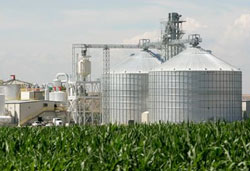A new report concludes that America’s ethanol industry is energy efficient and doing its part to reduce greenhouse gas emissions.
 The University of Nebraska-Lincoln’s Nebraska Center for Energy Sciences Research has just released its report entitled “Improvements in Life Cycle Energy Efficiency and Greenhouse Gas Emissions of Corn Ethanol” which was published in Yale’s Journal of Industrial Ecology (JIE).
The University of Nebraska-Lincoln’s Nebraska Center for Energy Sciences Research has just released its report entitled “Improvements in Life Cycle Energy Efficiency and Greenhouse Gas Emissions of Corn Ethanol” which was published in Yale’s Journal of Industrial Ecology (JIE).
According to the report, “Direct effect GHG emissions were estimated to be equivalent to a 48% to 59% reduction compared to gasoline, a twofold to threefold greater reduction than reported in previous studies.” The report also found that the eight corn-ethanol scenarios had net energy ratio (NER) values from 1.29 to 2.23, meaning ethanol returned 29 to 123 percent more energy than was required for its production.
The work is based in part on information compiled by the Department of Energy’s Argonne National Laboratory and is considered critical to educating the Environmental Protection Agency, the State of California, and other entities looking at ethanol’s capacity to reduce greenhouse gas emissions from liquid transportation fuels.

